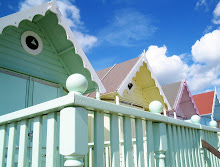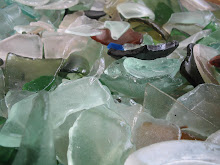
Miss Austen Regrets turned out, despite its mixed reception in the papers, to be perfectly watchable. As an attempt to 'get inside' the ever-elusive Jane, it was a considerable improvement on the saccharine and anachronism-ridden Becoming Jane. Olivia Williams was as beautiful to watch as always. It was, on the whole, well cast, well acted, well filmed and well produced. The ambiance of the costumes and sets tended towards those of the 1995 Amanda Root/Ciaran Hinds Persuasion - and thus recommended itself to me enormously, since this is by far my favourite Austen adaptation to date. The general mood was, as in Persuasion, essentially melancholic.
I can see very clearly why it did not go down well with Jane fans in the US, in particular. It was shown over there a while ago, and I've read a number of the reviews (including those listed here). The protests against it are largely on the grounds that it was not frothy and optimistic, not laden with sparkling wit and gorgeous men in wet shirts, and that it was, basically, too gloomy, too preoccupied with loss and regret and too concerned to point out the ignominies of spinsterhood and poverty in Austen's time.
To the fans who feel 'betrayed' by this film, I would say this: Miss Austen Regrets was seeking to discover and explore the real Jane Austen. Not the fictional Jane Austen who resides in the imagination as a glorious amalgam of her best beloved heroines - Lizzy Bennett and Emma Woodhouse. If you want to know why Miss Austen might have had Regrets, read more English social history (I don't mean frilly Jane-fan-history, I mean real grown-up history books) to get a proper handle on What Life Was Really Like In Those Days.
Also read Fay Weldon's excellent Letters to Alice: On First Reading Jane Austen - a (fictitious) series of letter from an aunt to her teenage niece (who doesn't see the 'point' or 'relevance' of reading Austen), which illuminates - by filling in some vital social/historical background and by teaching the youthful reader how to empathise with the writer as well as with her fictional heroines - exactly how much more of a genius Austen then appears than she might seem on a more superficial reading.
And superficial reading, it seems to me, is the wobbly, sprigged muslin pillar upon which an awful lot of gushy Janeism rests. The kind which views Austen's 'world' as a kind of touchstone of Shabby Chic. Cath Kidston meets Barbara Cartland.
To find out why and what Miss Austen Regrets, read the novels and then read between the lines of the novels - and in Mansfield Park and Persuasion in particular those lines are wide open for reading between. Read the correspondence and it's all there - you don't need to delve very far to spot it unless you refuse to lift the rose-tinted gauze veil before you set off on your journey.
Then, grow up a bit. If you haven't already reached 40 or experienced full-on mid-lifeism, then try to imagine it - in the context of the early 19th century. You are unmarried, you are poor, you are an artist who, though acclaimed, has never been properly remunerated because you are a woman. You are clever, you are witty and flirtatious, you are popular and yet, because you are unmarried (this being long before feminism, so please try to cast off your 20th/21st-century feminist spectacles for a moment and see things from an early 19th-century point of view), you have wealth, no power, little social standing, no sexual love, no children . . . no hope, but for an old age in which you are beholden to others, and a burden on your family. Moreover, you are ill, and don't have a cupboard full of Nurofen for the pain, a national health service to treat you, or even access to proper diagnosis, let alone cure. Is it so very surprising that the tenor of your latter years should, indeed, be Regret?
We'll never know Jane. It's difficult to get anywhere close, given that Cassandra (as highlighted in this film) destroyed so much of the correspondence. But I do believe that Miss Austen Regrets was an honest and attractive attempt - and a more creditable one than most - to flesh out what we do know into a believable 'character'.
But . . . in the end, it is fiction. And one question which did keep popping into my head as I watched was 'what is this for?' Ultimately, it was just a bit of telly, and should be treated as such.
It will of course be watched by GCSE students of English Literature and gobbled down as biographical fact, but I really don't think it should be. Even more than the myriad adaptations of the books themselves, it should be treated as ephemera. Entertaining, enjoyable, watchable ephemera, certainly. But if you want to 'find Jane' - or as much of Jane as there is left to be found, and in a timeless way, unfiltered by the mores of our own age - then you'll find her in her novels and her surviving letters if you read them afresh.
It is, believe it or not, still possible to read Pride and Prejudice without visualising Colin Firth. Granted, it's difficult, but I promise you that with a bit of effort, and by staring hard at those black words on those white pages, it can be done.
And . . . it's worth it.





















6 comments:
I'm so glad you mentioned Letters to Alice: On First Reading Jane Austen. Like Fay Weldon's niece, I was a bit of a 'don't get Jane Austen at all' type, right through school and up to including A-level (Mansfield Park). Years later, I read Fay and, hey-ho, I was like Saul on the road to Damascus and never looked back. And I would still rather read the novels and the letters than watch an adaptation.
By the way, your comments on Miss Austen Regrets are spot on.
What a brilliant post and you are just *so* right about everything. I enjoyed the drama, feeling that it may or may not have been close to the real Jane but certainly the facts about the plight of unmarried, poor women of those times was spot on. Oh and I have that Fay Weldon book on my tbr pile - better shift it closer to the top. And also... I have an American friend who thought the production was superb so not all Americans were anti.
It is as Cath said, not all Americans are anti. In fact, to show both sides of the critique story, I posted as many negative reviews as positive on my blog (thank you for the link), but overall we Americans liked this production, or so I thought. I placed a poll on my popular culture Jane Austen blog which shows that Miss Austen Regrets was among the least favorite movies recently showcased on PBS. It was that, or people didn't bother to vote for it.
I placed an answer to some of your concerns on my own blog. My reply might have come across harshly, but I was in a rush to get to work. This was a beautiful, intelligently written production Being much older than most of my readers and self-supporting, and having been bitten by the creative muse on a number of occasions, I just couldn't buy that Jane would have drained so much of her creative energy on regret. I simply question the degree to which it was shown in this production. As you said, we'll never know, and this was, after all, a mere television show.
Miss Austen Regrets was by far my favorite new film shown during the "Complete Jane Austen Series" here in the States. Like you, I completely connected with the melancholy in the film and felt, as an unmarried writer of romances myself, I understood where the emotion in this film came from.
My review: http://kayedacus.com/2008/02/03/miss-austen-regrets/
having watched Becoming Jane last week I'm looking forward to settling down in a quiet hour to watch Miss Austen regrets. I've had the same copy of Pride and Prejudice on my bedside table since studying it at A level some 18 years ago and regualrly (at least once a month) dip into it. you are right it is possible not to think of Colin Firth whilst reading it (though I still enjoy watching it :-0).
Here here, Juilet! I haven't seen this program but I concur completely with the sentiment that Jane Austen features in the popular imagination as someone who, if transported forward to our time, might be chosen to star in a shampoo commercial (in period costume with the benefit of a push-up bra, of course).
Post a Comment